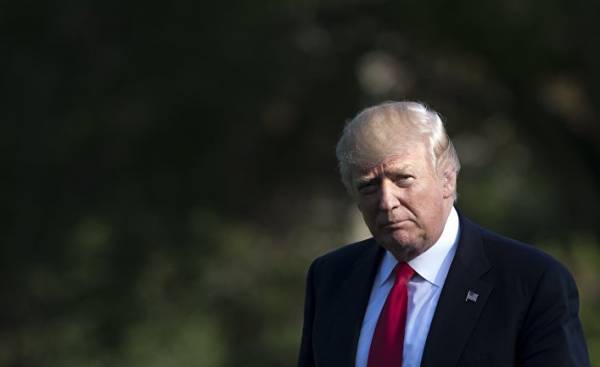
President Donald trump on Wednesday signed a bill on sanctions against Russia, which it imposed on Congress. The President announced that the administration would carry out the law, but he has comments about its negative consequences and constitutionality of certain provisions of the document.
In the statement accompanying notice of the fact that the President signed the bill, thus giving it legal force, trump outlined a number of concerns, stating that the amendments infringe on presidential powers could have a negative impact on the ability of the U.S. to engage with allies and to have unintended consequences for American companies.
“Although I support tough measures to punish and deter Iran, North Korea and Russia for their aggressive and destabilizing actions, this law is not perfect, it has significant shortcomings,” — said in a statement the White house statement.
Trump’s statement does not indicate any intention to circumvent the aspects of the law. On the contrary, the President indicates that he wants his administration had fulfilled the law in accordance with his constitutional powers. This formulation admits a certain possibility of interpretation of how the laws are enforced.
Fears trump relate to the four spheres. We are talking about the infringement on Executive powers, about unintentional damage to us companies, American business and foreign partners, as well as about the limitations of the capacity of the administration, which would allow it to act in accord with the allies against Russia.
The European Union has warned about possible retaliation if European companies will suffer from the sanctions, aimed at limiting the export of energy resources from Russia.
The bill, which veto is not threatened
The bill passed in the house of representatives and in the Senate by an overwhelming majority to overcome a presidential veto, tightens sanctions against Russia and allow Congress to block the initiative of the President on its abolition. The bill also imposes new sanctions against Iran and North Korea.
Sanctions against Russia and restrictions on the powers trump marked the IRE of congressional Republicans who condemn the President’s actions, which happens very rarely. Lawmakers decided to limit the ability of the President to ease sanctions against Russia at a time when the committees of the house of representatives and the Senate, and the Federal Bureau of investigation trying to determine was whether some members of his campaign headquarters in cahoots with Russia in the case of interference in the elections of 2016.
Approval of the bill by Congress, provoked retaliatory action by the Russian authorities, who demanded the United States to reduce the number of diplomats and other employees of the diplomatic mission in Russia for several hundred people. These events led to increased tensions between the two nuclear powers. Their relationship was at its lowest level since the cold war.
The Chairman of the Federation Council Committee on international Affairs Konstantin Kosachev wrote on his page in Facebook that, by signing the sanctions trump “gave up” and now the responsibility for the “fatal consequences” associated with the implementation of this law, is “not just the authors, but also on the trump.”
Russia’s Reaction
“US not leave a chance for constructive cooperation with Russia — an important partner in solving the Central problems of modern world development,” Kosachev wrote, adding that “the prospects for further settlement of the Iranian and North Korean issues look bleak”.
The chair of the Senate foreign relations Committee Republican Senator Bob Corker (Bob Corker) said that he didn’t care what the law could further worsen relations between Russia and the United States.
“They are already very bad. And unlikely to become worse,” he said.
As stated by the American legislators, they want to deny the President the ability to unilaterally remove sanctions imposed by the predecessor trump, ex-US President Barack Obama for interfering in last year’s elections in the United States and the aggression in Ukraine.
The ability to negotiate
White house officials argue that this adversely affected the ability of the President to negotiate. In a separate statement, the trump, announcing the signing of the bill, said that it has unique abilities in this area.
“I created a really huge company that is worth many billions of dollars, he said in a statement. — In many ways, this was the reason that I was elected President. As President, I can conclude with foreign countries much better deals than the Congress.”
The bill was approved in the house of representatives and in the Senate with a huge margin of votes, which indicates that a presidential veto will be overcome. Statement at the signing — not a new phenomenon, but in modern times they began to speak more often. Obama and George W. Bush used signing statements in order to Express dissatisfaction or to make it clear that they intend to amend the law, which they were forced to sign, despite his own objections.
“Actually, this is an area where the actions of the administration will be watching very carefully,” says Peter Fever (Peter Feaver), Professor at Duke University and Director of the Institute for the study of security problems (Triangle Institute for Security Studies), who worked in the office of the national security Council during the presidency of bill Clinton and George W. Bush.
According to him, the draft law on sanctions was adopted “by an overwhelming majority in both houses and is one of the most important and topical issues. And if the President tries to plunder and to circumvent the restrictions provided for in this law, I think, politically, it will cost him very expensive.”
The fever also said he expects that Congress will replace the law on sanctions and the new offer, which will give Trump more freedom of action. According to him, it can happen as soon as the administration will develop clear and strict policy towards Russia.
“It (the law) due to existing on Capitol hill view that the administration has no coherent policy towards Russia, and the fact that the administration has not yet adheres to common opinion about the actions of Russia, — he said. — When the administration will do so and will receive the support of both parties, Congress will replace the law on sanctions by another law, which is the position of exclusion, giving the President the right to decide for reasons of national security and national interests. Or a more common, traditional right to increased freedom of action.”







